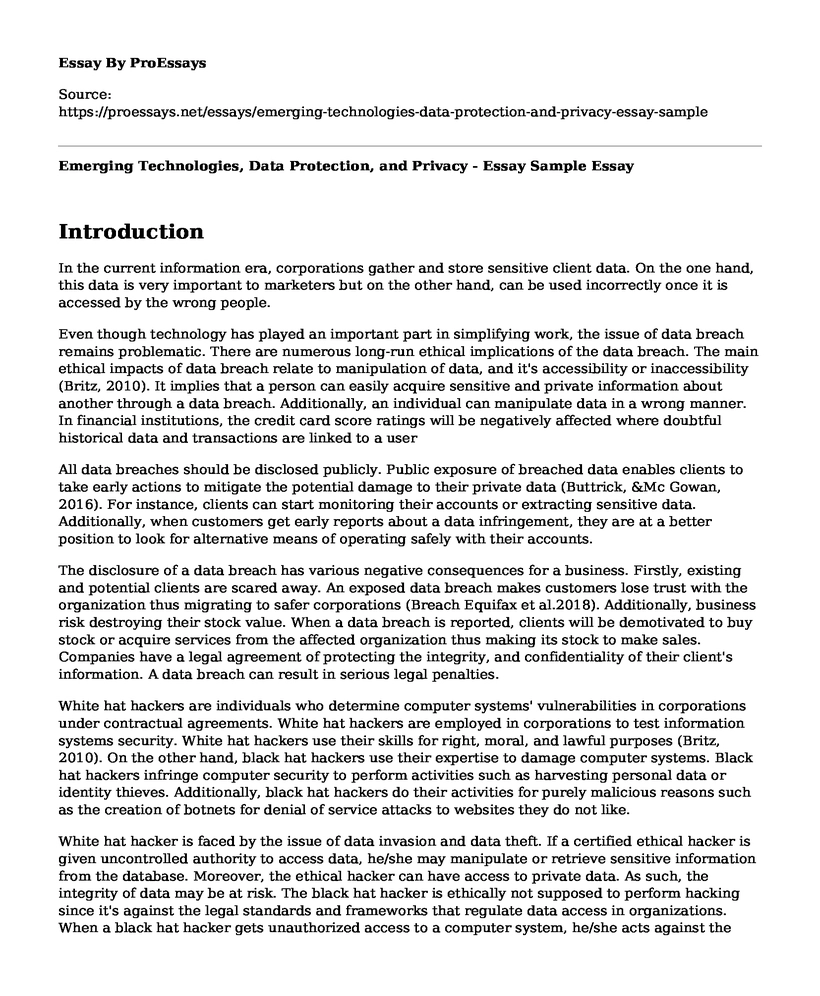Introduction
In the current information era, corporations gather and store sensitive client data. On the one hand, this data is very important to marketers but on the other hand, can be used incorrectly once it is accessed by the wrong people.
Even though technology has played an important part in simplifying work, the issue of data breach remains problematic. There are numerous long-run ethical implications of the data breach. The main ethical impacts of data breach relate to manipulation of data, and it's accessibility or inaccessibility (Britz, 2010). It implies that a person can easily acquire sensitive and private information about another through a data breach. Additionally, an individual can manipulate data in a wrong manner. In financial institutions, the credit card score ratings will be negatively affected where doubtful historical data and transactions are linked to a user
All data breaches should be disclosed publicly. Public exposure of breached data enables clients to take early actions to mitigate the potential damage to their private data (Buttrick, &Mc Gowan, 2016). For instance, clients can start monitoring their accounts or extracting sensitive data. Additionally, when customers get early reports about a data infringement, they are at a better position to look for alternative means of operating safely with their accounts.
The disclosure of a data breach has various negative consequences for a business. Firstly, existing and potential clients are scared away. An exposed data breach makes customers lose trust with the organization thus migrating to safer corporations (Breach Equifax et al.2018). Additionally, business risk destroying their stock value. When a data breach is reported, clients will be demotivated to buy stock or acquire services from the affected organization thus making its stock to make sales. Companies have a legal agreement of protecting the integrity, and confidentiality of their client's information. A data breach can result in serious legal penalties.
White hat hackers are individuals who determine computer systems' vulnerabilities in corporations under contractual agreements. White hat hackers are employed in corporations to test information systems security. White hat hackers use their skills for right, moral, and lawful purposes (Britz, 2010). On the other hand, black hat hackers use their expertise to damage computer systems. Black hat hackers infringe computer security to perform activities such as harvesting personal data or identity thieves. Additionally, black hat hackers do their activities for purely malicious reasons such as the creation of botnets for denial of service attacks to websites they do not like.
White hat hacker is faced by the issue of data invasion and data theft. If a certified ethical hacker is given uncontrolled authority to access data, he/she may manipulate or retrieve sensitive information from the database. Moreover, the ethical hacker can have access to private data. As such, the integrity of data may be at risk. The black hat hacker is ethically not supposed to perform hacking since it's against the legal standards and frameworks that regulate data access in organizations. When a black hat hacker gets unauthorized access to a computer system, he/she acts against the ethics of maintaining data integrity and confidentiality.
The utilitarian theory would greatly support the activities of a white hat hacker. The theory states that "an action is moral when it yields the greatest amount of good for the largest number of people" (What is utilitarianism, 2018). Even though ethical hacking exposes the integrity and confidentiality of data to a few people it serves the best interest of protecting the security of millions of individuals' data. Therefore, the utilitarian theory would greatly back up the work of an ethical hacker in computer systems.
References
Britz, J. J. (2010). Technology as a threat to privacy: ethical challenges to the information profession.
Buttrick, H. G., Davidson, J., & McGowan, R. J. (2016). The Skeleton of the Data Breach: The Ethical and Legal Concerns. Rich. JL & Tech., 23, 1.
Breach Equifax Exposed More Consumer Data Than First Disclosed. (2018). Insurance Journal. Retrieved 12 March 2019, from https://www.insurancejournal.com/news/national/2018/02/13/480357.html
What is Utilitarianism? - Definition & Theory - Video & Lesson Transcript | Study.com. (2019). Study.com. Retrieved 12 March 2019, from https://study.com/academy/lesson/what-is-utilitarianism-definition-theory-quiz.html
Cite this page
Emerging Technologies, Data Protection, and Privacy - Essay Sample . (2022, Dec 12). Retrieved from https://proessays.net/essays/emerging-technologies-data-protection-and-privacy-essay-sample
If you are the original author of this essay and no longer wish to have it published on the ProEssays website, please click below to request its removal:
- Annotated Bibliography: How Smartphones and Tablets Affect Children's Development?
- Fintech Industry Paper Example
- Essay Example on Cybersecurity: Time for Governments to Act to Curb Threats
- Essay Example on Unveiling the Mystery of Computer Code: How It Works
- HCA Health Care: Overcoming Data Challenges With Tech Trends - Essay Sample
- Internet: Most Useful Technology in Modern Times - Essay Sample
- Essay Example on Leveraging Windows Server 2016: Nano Server & Beyond







